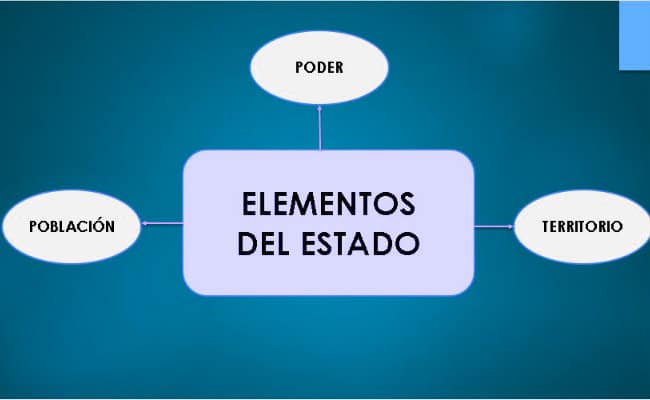
The state, from the Latin "status" which refers to order. Using in terms of countries and regions, it means that it is the political organization of a country. The elements of the state are 4, which according to what is established that make it up: the population, the territory, the government and its sovereignty.
It can also be called physical elements to geographic spaces by which the state is made up, as well as the population that inhabits the territory of the state, and the government and sovereignty make up the administrative part of it.
The function of the state is to maintain an order among all the areas that comprise it, taking into account that the government exercises its power or sovereignty with respect for the rights of the population that lives in the territory, and their well-being.
Governments are transitory, depending on the laws applied in each country. They have a certain durability, and normally or in democratic governments, the main responsibility for the election of rulers is held by the population, which is carried out through popular elections.
What is the state?

This can have several definitions, all depending on the area in which it is being spoken, for example: the state refers to the situation in which an individual or an object is found. But when we speak in terms of society and legal, it is about the entity that provides the order established between the people, the territories that comprise it and the governmental entities.
To achieve political and territorial organization of a state, this must exercise judicial, enforceable and legislative activities, which establish the how and why of the rules that must be followed for good coexistence in it.
It can also present various types, such as the compound state that means the union of two or more states to exercise sovereignty over a people, the simple or unitary state that refers to a single state, which is responsible for establishing and directing the entire population. , and there is also the decentralized state which is not made up of a central government, as its name says, but rather divides its power into local rulers.

What are the elements of the state?
The elements of the state are all those that make it up, and among them are, the population or nation, the territory, the government, and the sovereignty or power that is exercised, then the functions, rights and duties of each of the they.
The population
They are all those individuals that make up a company located in a territory determined by the state, which pursue a joint common good with the rulers.
The population can be seen from two different perspectives, as a human group and as a nation.
- As a human group: It is intended to refer to a group of people who live in a territory, who are applied a set of legal norms for the establishment of their order, each one as an individual pursues the goal of achieving their own well-being, normally separated by economic levels . There are governments that do not take into account the welfare of the entire population simply because they have different cultures or religious beliefs, and this has been observed throughout the history of humanity.
- As a nation: In this it is possible to observe a more united population in terms of the same religious beliefs and with common goals, they feel united by material ties, with the feeling of belonging to the state and everything that makes it up.
There are several types of nations, such as those that feel a bond of language and culture so strong that when they see a person who is not part of them, or has different thoughts, they simply choose to exclude him from their society, thus as there are also nations that seek the common good, This refers to that of all the people who make up the same, regardless of their race or ethnicity.

The territory
Is all that geographic space in which a population lives which is inviolable and inalienable, this is comprised of the air, maritime, soil and subsoil that make up the state.
In Spain, for example, there are several autonomous communities which have their own culture and language, but which are also part of a nation. In several of these cases it has been seen that over time these communities end up trying to become independent from the nation, wanting to renew themselves as a free state. The most common divisions of territories are provinces, cities, towns or regions.
The governments
Refers to the organization u legal system which apply laws in order to ensure that society remains under a margin of society and good living among the community. Governments are divided into some groups, of which they are divided according to what elements of the state have power, among them the following stand out:
- Democracy: In this type of government, the people are the ones who have the power to choose which ruler they prefer for themselves and the laws that may or may not be applied, in which freedom of expression and the division of powers stand out. Those in charge tend to have temporary posts, because long terms of office are not usually allowed in democracy.
- Theocracy: It is when religion and politics act together to govern a nation, with the dominant religion being the one involved.
- Fascism: It is a movement in which the characters in power or who want to be among them, produce in the population through propaganda, nationalistic sentiments, and which in turn are totalitarian and centralized.
- Dictatorship: It is based on a person or small group of people having absolute and irreproachable power, overriding the rights of the population, this type of government is considered hostile, since they use the force of the army so that society obeys the terms that they establish.
There are also other types such as the Monarchy, or the Republic, but the most relevant and common worldwide are the four mentioned above.
The soberand
It involves the power exercised by the state government to its population, which is very relevant with respect to the order that you want to establish in a territory and its inhabitants.

The word sovereignty comes from the Latin "super omnia" which means supreme power, and it can be understood as the power of everything, and this is demonstrated by knowing that it includes all areas of a nation, such as economic, legal, and political and social.
The relationship between the elements of the state must be very close and good, to ensure that all parties obtain benefits, which is also called the common good. Between the different states their borders and ideals must be respected, so that in turn there is peace between the different societies that inhabit the entire terrestrial territory.
snmsm vm
u09
8u
0
80
8
8
¡
¡
You must check the wording.
Can a state survive if it does not have one of its elements?